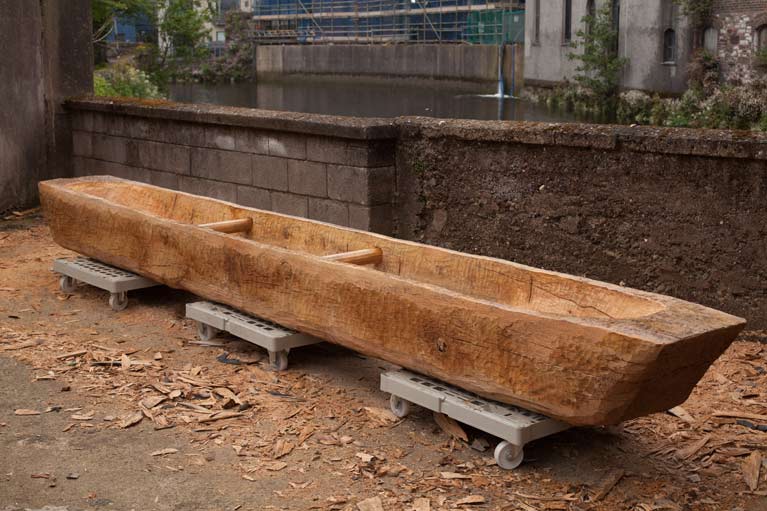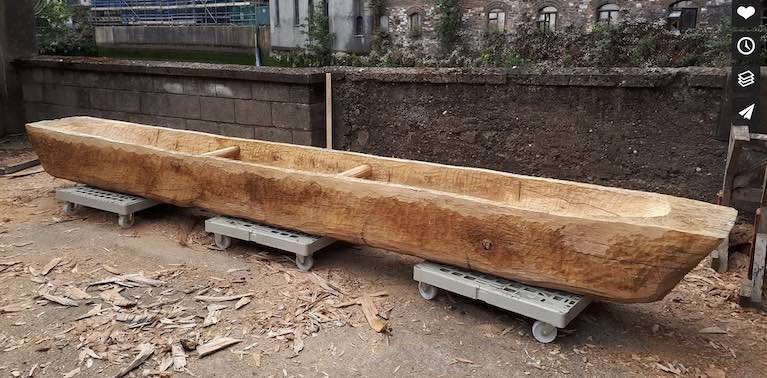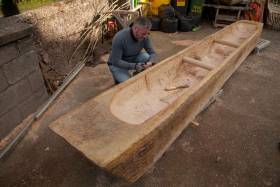Displaying items by tag: logboat
It’s been confirmed that two of three logboats spotted by drone in the River Boyne in recent weeks are new discoveries, and could date from medieval times.
As previously reported on Afloat.ie, citizen archaeologist Anthony Murphy captured the first of his unique aerial images while searching for a dolphin that’s been delighting Drogheda’s denizens.
Over subsequent days he spotted the outlines of two more logboats in close proximity, though he presumed they were among a number of such vessels already known to the National Monuments Service (NMS).
But as RTÉ News reports, the NMS has now confirmed that the first and third boats spotted by Murphy are indeed new discoveries — and could date from the Norman fortification of Drogheda.
RTÉ News has more on the story HERE.
A citizen archaeologist may have spotted the remains of two previously unknown medieval logboats in the River Boyne.
Last week, The Irish Times reported on Anthony Murphy’s drone footage of a rectangular object in the riverbed captured on Monday 26 April, while he was observing for the dolphin recently spotted in the river near Drogheda.
The National Monuments Service (NMS) suggests this may be a vessel first discovered last year and which could be as much as 1,600 years old.
Subsequently, Murphy reported a second sighting on Wednesday 28 April, at a location some 200 metres from the previous find.
“It appears to be upside down, is very flat-bottomed and is larger than the first one,” he wrote on Twitter.
Further aerial investigations over the weekend revealed what appears to be a third logboat some 400 metres downstream of the first, west of the Bridge of Peace.
THIRD LOGBOAT SPOTTED!
— Mythical Ireland (@mythicalireland) May 2, 2021
I spotted a third logboat in the river Boyne at Drogheda this morning using my drone. It is located about 400 metres downstream of the first logboat I saw and reported on Monday last.https://t.co/yBc5ADlnmh pic.twitter.com/SS4o5xc92i
Murphy details the find on his blog Mythical Ireland, where he estimates this third vessel to be around 15ft in length.
However, he harbours no illusions that his “discoveries” have never been spotted previously.
“I’m assuming this is one of these ‘few’ logboats which NMS says it is aware of in the River Boyne at Drogheda,” he says. “However, the drone photography of same brings a new perspective on these ancient artifacts.”
As for why these remnants of Ireland’s ancient history are becoming easier to find now, Murphy believes it’s a combination of “exceptionally low” spring neap tides due to lack of rainfall, and clearer water due to reduced pollution in the river.
New Film Shows How Tree Went From Oak to Boat in Iron Age Replica Project
An oak tree’s transformation from trunk to replica iron age boat on Connemara's Lough Corrib has been filmed as part of a University College Cork (UCC) project.
Entitled "A New Logboat for Lough Corrib: The Pallasboy Project", the film was made over 20 months and documents how the logboat was modelled on a 2,400-year-old vessel found at the bottom of Lough Corrib.
The original was partially excavated and recorded by Karl Brady of Ireland's National Monuments Service's Underwater Archaeology Unit.
Photographer and former archaeologist Brian Mac Domhnaill’s film begins with the felling of an oak in the Vale of Clara, Glenalough, Co Wicklow in November 2017.
It closes with the boat’s maiden voyage at Knockferry, Lough Corrib in Galway in July 2019. The boat launch was hosted in partnership with Moycullen and Oughterard Heritage, and drew national media attention.
UCC archaeologist Dr Benjamin Gearey noted that the film documents the painstaking process of converting around two tonnes of oak tree into a close replica of a 2000 year vessel, and its joyous maiden voyage onto the waters beneath which the original still lies".
As Afloat reported last July, the replica was modelled on the sunken boat that measures some 7.5m long, 0.61m wide and 0.4m deep.
It was created by Mark Griffiths, as part of the Pallasboy Project, an international collaborative study established at UCC to investigate the crafting of prehistoric wooden objects and involving archaeologists, woodworkers and artists.
After the log was felled and the trunk prepared, Griffiths carved the replica over a period of 18 days at the Meitheal Mara community boatyard in Cork City, using a combination of replica prehistoric and modern tools.
The project was funded by the World Wood Day Fund via the International Wood Culture Society. The replica log boat has since been gifted to Moycullen Heritage Society.
When a replica of an Iron Age log boat is launched for the first time in Lough Corrib today, there may not be too much disappointment if it doesn’t actually float writes Lorna Siggins.
Archaeologists suspect that such “dug out” vessels could have been made for ritual purposes – designed perhaps to sink seamlessly to the bottom as part of a river or lake burial.
The original 2,400-year-old craft on which this replica is designed is already sitting on Lough Corrib’s bed, having been carved from a single oak timber.
The 7.5m long craft found close to Lee’s island was discovered by marine surveyor Capt. Trevor Northage and surveyed by Karl Brady of the Underwater Archaeology Unit of the National Monuments Service.
Capt Northage has identified a number of early Bronze Age, Iron Age and medieval craft and “Viking-style” battle axes and other weapons while mapping the Corrib to update British Admiralty charts.
 The finished log boat Photo: Brian MacDomhnaill
The finished log boat Photo: Brian MacDomhnaill
During an assessment dive on the Lee’s island logboat by Mr Brady’s team, an axe dating back 2,400 years was found, along with a long oar for steering and an iron spearhead.
The craft, which was radiocarbon dated to around 75 to 409 BC, may have been designed to have a short lifespan, and was “not for sustained use”, according to archaeologist Niall Gregory.
“The fact that the axe was deliberately and permanently secured beneath the thwart... suggests ritualistic connotations,” Mr Gregory has observed on the Pallasboy project’s blog.
Dr Benjamin Gearey, archaeology lecturer at University College, Cork (UCC), worked with Mr Brady and a team including Dr Paul Naessens of NUI Galway to create a replica at the Meitheal Mara boatyard in Cork. It will be launched at Knockferry pier in Moycullen, Co Galway today (sat).
Woodworker Mark Griffiths crafted the replica from a single piece of oak, using age-equivalent tools and contemporary equivalents – for comparison purposes.
It was documented by photographer Brian MacDomhnaill as part of the Pallasboy project - an experimental archaeology initiative established five years ago to design a replica of an Iron Age wooden vessel discovered in Toar Bog, Co Westmeath in the year 2000.
The Lee’s island logboat is not the oldest craft lying in lough Corrib. The 4,500-year-old Annaghkeen log boat had been sitting on lake bed for 3,500 years when the Vikings arrived, Capt Northage has pointed out. It is one of three craft located within a 30 mile radius.
The 12m-long Annaghkeen vessel is almost identical to the Lurgan log boat found in 1902; and the Carrowneden boat found near Ballyhaunis, Co Mayo, in 1996.
The Lee’s island logboat project was supported by the World Wood Day Fund. The replica will be test launched at Knockferry pier in Moycullen, Co Galway, at 3pm today (sat) before being given to the Moycullen Heritage Society for display.
Dr Gearey, Mr Brady and Mr Griffiths will talk about the project in the Boat Inn, Oughterard, Co Galway at 6pm this evening (sat).






























































